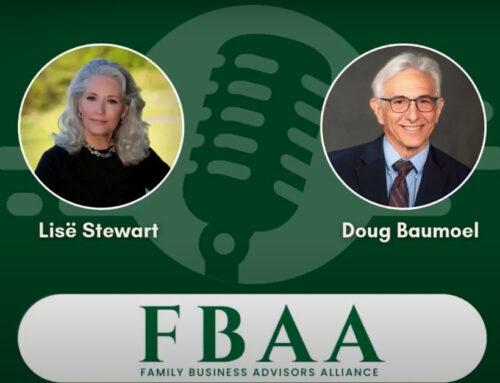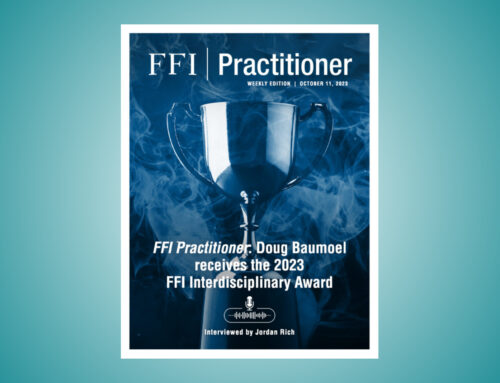Manufacturing Matters – Episode 11
Listen to what the experts shared about managing conflict in a family business versus a traditional organizational structure. Are there Best Practices? How do multi-generational businesses function differently from one another? And what is the “Family Factor?” You will definitely have a few ‘Ah Ha’ moments. Brought to you by Simsbury Bank
Martin Geitz:
Martin Geitz:
Difficult Conversations with UConn Family Business Program June 26, 2019
Welcome everyone to this, our sixth Simsbury Bank, UConn School of Business Family Business Program event. Thank you all very much for coming today. My name is Martin Geitz. I’m president and CEO of Simsbury Bank.
Today’s topic is difficult conversations. The intersection of family dynamics with the running of a business adds an entire dimension to roles, relationships, and decision making that is not present in businesses that are not run by members of the same family. This can lead to difficult conversations, and sometimes to conflict. We’re very fortunate today to have two experts in the family business dynamics to share with us their perspectives. Blair Trippe is an experienced negotiator, mediator, and family business consultant. She is the managing partner of Continuity LLC., a global firm working with family businesses and their stakeholders. Blair is also the coauthor of a book called Deconstructing Conflict. A book that shines a very bright light on the complexity of family business member relationships and managing conflict that may arise from them.
Blair earned her MBA from Northwestern’s Kellogg School, and her undergraduate degree from Connecticut College. Dr. David Souder is the Interim Dean of UConn School of Business. He’s been a member of UConn Faculty for 12 year. His areas of expertise in addition to family business include long-term corporate investments, organization design and sustainability, and mergers and acquisitions. His scholarly work has been published in a variety of academic journals. Prior to joining academia, Dr. Souder spent a decade as a strategy consultant. Dr. Souder earned his PhD from the University of Michigan Carlson School and his undergraduate degree from Wharton. So please join me in welcoming Blair Trippe and David Souder.
Thank you Martin for that nice introduction. Nice to see some familiar faces and also some new faces out there today. It’s a pleasure to be back here and glad you could join us. So the book is great. You’re going to enjoy it, and we’re going to use some time over the next 45 minutes to let you get a little preview of the book and understand what was going on. But I wanted to start… writing a book is a big task. What made you want to do it, and what were you trying to say that’s different than what’s out there already?
Well I also want to say thank you for the introduction and it’s really a pleasure to be here. So thank you for coming this afternoon. My partner Doug Baumoel who was coauthor with me, we had been working in the family business field for a while. And we found that there was a lot of literature out there that was really
Martin Geitz:
David Souder:
Blair Trippe:
Page1of15
Blair Trippe:
Blair Trippe:
Blair Trippe:
David Souder:
David Souder:
Blair Trippe:
focusing on best practices. Best practices for succession, from governance, for bringing your child into the business. And we came to believe that really all of these best practices were really good ideas that work for some families. Some successful families employ them, some unsuccessful families employ them. And basic family business research is somewhat skewed towards those who are successful. But we felt that the best practice for your family business hasn’t been written yet, and that you really had to start with a clean sheet of paper and not make assumptions on, “I read this in the book.”
I talk about parenting books. If any of you have ever read parenting books, they don’t work because your situation is different. And so we came up with really a methodology for how do you unpack what is going on in a family enterprise? How do you understand what are all the challenges in this particular family with this constellation of people and issues, and challenges and what not? And how do you make sure that you understand the complexity that’s inherent in the family enterprise, and not miss anything. And come up with a way to really understand what is going on.
So with Doug, who’s got an engineering background, I have a psychology background. We both have MBAs, but we looked at things very differently. And I brought a lot from dispute resolution. He brought a lot from systems thinking and engineering. And we came up with this equation for how do you understand what is going on at all times in a company, and how would you unpack and be able to understand how you would approach what was going on?
So we had this great intellectual property that we made people sign NDAs when we walked them through it. And we thought this actually really works, and we should put it out there. So we thought let’s write a book. And five minutes later it was done.
I don’t believe that. So not best practices. And that’s actually a theme we talk about. So as Martin said, I’m a strategy professor by trade. We actually talk about it. If you’re falling a best practice, you’re not really customizing to the situation. It’s not really strategy. And that sounds like a big part of your motivation behind it.
But I think one of the things you did notice as a common denominator is that conflict is present in almost every family business at some point. But you have a little bit of a unique approach in that you’re not trying to eliminate conflict. You’re talking about how to manage it. So can you preview it a little bit for the people who read the book later? What does it mean to manage conflict, not eliminate it?
Well, I think if you make a distinction between dispute resolution and conflict management, you’ll get a sense of where I’m going with the concept of managing it. Conflict is really built into the structure of family enterprise. And that’s because stakeholders have very interdependent roles and responsibilities. They have so much that’s going on and complicated. And the relationships make
Page2of15
Blair Trippe:
David Souder:
David Souder:
Blair Trippe:
it even more difficult to understand what is happening. That you can’t just resolve one dispute and move on. Because if you think of it as a Whac-A-Mole, you resolve a dispute. There’s going to be another one that’s going to pop up. And you’ll resolve that, there’ll be another one that’s going to pop up. If you think of a family enterprise more like a chess board where there are lots of moving parts and you really have to understand the entire board. And you move the queen across the board, that could be a good move. But only within the context of everything else that’s going on.
So if you look at things from that standpoint, you understand that there is no way to resolve things and make it go away. You have to just recognize that there are constantly going to be challenges, and sharing of roles, and disputes, and uncomfortable situations that come up. Just because families are complicated, businesses are complicated. And you put them together, and it’s even more complicated. So that’s our thinking.
One of the nice things about the book, and you can hear it in that answer, is that there’s a lot of metaphors that are really appropriate for bringing out the ideas. So the Whac-A-Mole and chess and things like that. It’s the same thing reading the book you see, “That’s what they mean by that. Okay, that makes sense.”
So we invited people here on the premise that part of managing conflicts is dealing with difficult conversations. What’s your experience with that and how does that play into your framework?
Well, I think a difficult conversation is really anything that makes you feel uncomfortable or awkward. Anything that really makes you worry that something important is going to happen that’s going to alter your reality or the situation that you were hoping for. So you’re looking at how do I approach a conversation that could have tremendous impact, or could have spillover effects or ramifications that maybe I hadn’t been counting on? And if you think of the framework that most conversations, and I borrow this from the book, Difficult Conversations by Doug Stone and Sheila Heen. If you haven’t read that, that’s a really great book.
But the framework is essentially saying that each conversation is divided into three separate conversations. There’s the what happened and what are we talking about? There’s the emotional component, how am I feeling about this? And then there’s the identity component, which is about what is that saying about me?
So if I ask for a raise, there’s a discussion about how much I should get. There is also how I feel about it. Do I feel worthy? Am I feeling like I deserve it and what’s going to happen if I don’t get it? And then there’s the identity piece that makes me worry if I don’t get it, does that mean I’m not worthy or I’m not lovable, or my father just never really liked me as much as he liked my brother? So there are all these things that are packed into one conversation, which makes it very difficult to navigate.
Blair Trippe:
Blair Trippe:
Page3of15
David Souder:
Blair Trippe:
David Souder: Blair Trippe:
Blair Trippe:
Blair Trippe:
Blair Trippe:
David Souder:
We’re trying to get away from the one size fits all advice. But any general things, examples that you’ve seen where it works better than others for managing a difficult conversation?
Like any negotiation that you would ever enter into, preparation is key. The more you can understand for yourself, what are your goals? What are you trying to achieve from this? What are your interests? And to keep yourself focused on your interests at the end of the day. Principles are great, but they don’t help you in the end. I shouldn’t say they don’t help you in the end. Principles are good. We need to be principled. However, you don’t go to court on principle. You’re going to fund a lot of attorneys’ summer homes. You really want to be looking at what is it that I want? What am I trying to achieve, and what are the things that I need to worry about?
In the experience that you and Doug have had working with family businesses, what are some of the primary triggers for conflict?
We talk about it in the book. What triggers an active conflict is some use of disrespected power. So when somebody exerts power over a person or a group of people in a way that is not respected, that’s going to trigger conflict.
So for example, if I’m the marketing director and my brother is the CEO of the company. And I work really hard on my marketing plan and my brother CEO says, “That’s terrible. You should go redo it.” I might be upset. I might think I should get a new job because I think this is really great. And if my values and what I think is important doesn’t fly, maybe this is the wrong place for me.
If I respect that my brother got that job because he went to the right school, he has the skills, he works really hard, the employees respect, etc. I’ll take it on the chin and I’ll say, “Okay, I guess I need to redo it.”
On the other hand, if I believe that he got the job because he’s the oldest, or because he golfs with dad and I don’t. Or because he’s mom’s favorite for whatever reason. And I don’t respect that he works hard, or that he knows what he’s doing, or that the employees respect him. Then that’s going to really trigger a conflict, because I’m going to be forced into a position in a way that I don’t respect. And that’s usually a trigger.
It struck me in reading the book that these weren’t the words you use, but it reminded me of something I remember learning as a graduate student. This wasn’t family businesses, this was businesses in general. But when coworkers disagreed over tasks, they could still make it productive. But if the disagreement was based in the relationship, not the task, then it was hard to move forward. And so devil’s advocacy and things like that work because people understand it’s not relational, it’s in the task. And people are posing them for good reason. And if they don’t understand that, then it kind of falls apart very quickly.
Page4of15
Blair Trippe: David Souder:
Blair Trippe:
Blair Trippe:
Blair Trippe:
David Souder:
Right.
Have you seen a difference, big organizations, small organizations? Is that one of the ways you can customize advice, or does this play out similarly across the board?
What’s most important in the work that I do when I work with a company is at what generation do they find themselves? If they’re transitioning from first to second generation, that’s a challenge for certain reasons. Transitioning from second to third, there are different kinds of challenges. Third to fourth, even different challenges there. So where they are in the generational progression will have a large impact on what they need, and what they’re grappling with most likely.
The size of the company doesn’t really matter. Except when it’s a very small company, the problem is that the threats are really existential. And they don’t necessarily have the resources to implement the options that we can put forth to get them to move out of the situation they’re in.
That’s really the difference. The other thing is, is that they don’t have the same opportunity as larger companies to sell or to bring in a third party financial partner. When it’s a very small company, you can sell it. But by the time you paid the taxes, etc., you might still need a job or your children might need a job. And if you’re not accustomed to working for other people and you’re in your 50s or 60s or whatever, that’s pretty tough. So the larger companies have more options and more ability to implement different strategies.
Okay. So at the core of the book, a lot of the book is centered around something called the conflict equation. So, I’m going to ask you to say a few things about it, but it struck me … so it’s math, but without numbers. And I realized that some of my students would really like that. And I said that to you earlier. I realized that there are other of my students that really wouldn’t, I have other students that are really mathy and would find it very disconcerting. But it’s math principles and moves the levers around. So we don’t want to ruin the book or try and get the whole thing. How many different factors go into the conflict equation? There’s a whole bunch. You probably-
Yeah, there are about eight in the basic equation, but there are subsets that define what each of the individual components might or some of the components might-
Right. Consist of.
Each of the eight makes up its own chapter, and you go through it in detail. I wanted to ask you about one of them because some of the other ones you kind
Blair Trippe:
David Souder: Blair Trippe: David Souder:
Page5of15
Blair Trippe:
Blair Trippe:
Blair Trippe:
Blair Trippe:
Blair Trippe:
Blair Trippe:
Blair Trippe:
Blair Trippe:
of get from the name of them if we list them out. But one of them was the family factor. That one takes a little more explanation. Can you tell us a little bit about the family factor and how you came up with it, and what it means, and how it fits into the equation?
So the family factor I think is actually the most important component of the entire equation. Essentially the family factor answers the question, is the family bond strong enough to leverage compromise, forgiveness, and commitment to change? So is your family bond going to help you act not necessarily in your own self-interest, but compromise because you are going to do things for the sake of the family? And there are components, sub-components to the family factor. And we break it down and we look at shared history, vision for being family in the future, and trust.
So shared history is do you have a meaningful shared history? Not just your siblings. Of course you have a shared history, but sometimes you have siblings that are 15 years apart in age. And they didn’t really grow up together. So maybe they don’t have much of a shared history. They might have some shared narrative, but they don’t have a meaningful shared history. So that makes it a little bit harder.
Do they have a shared vision for being family in the future? So do you think that every 4th of July you’re still gonna get together at the lake or you’re going to spend Thanksgiving together? This is a vision for being family going forward regardless of what happens with the business.
So if you have that, you really have something to gain by working things out. Similarly, if you have a shared history, you have something to lose if you don’t figure things out.
And then there’s trust, which is really very important. I look at trust differently from the way many of you might look at trust. So people think of trust as, “I’ve got your back. I like you. We want the same things. I’m going to make sure that you can trust me. We’re going to do the same thing,” which is great when things are going good. But as soon as I change what I think, that doesn’t really hold up.
You also might think about trust as feeling safe when you’re being vulnerable. I can trust that I can make myself vulnerable to you because you’re not going to take advantage of me. And that also works for a while, but not always.
So when I think about trust, I’m really thinking about predictability. Do I know you well enough to predict how you will behave in any given act, at any given situation? So that I know that I can act not in my own self-interest, because I know what you’re going to do.
Now I might be able to know that you’re going to do exactly the opposite of what I want every single time. You know that I want B, I know you’re going to
Page6of15
Blair Trippe:
David Souder:
choose A. But if I know that, then I can trust you. I can trust what you’re going to do.
So having a strong family factor says that I have something to lose if I don’t compromise and commit to some change. I have something to gain if I do, and I can trust how you’re going to behave. And as a result, we can make decisions together.
It’s one of the interesting things in the book is this idea of predictability is trust. As I went through it, there’s this list of things and they’re kind of about trust. I read quickly at first and I’m like, “That kind of doesn’t right.” And then I went and looked back. It’s a list of things that are not trust in your definition. But they would sound like things that people would often describe as trust and say about trust. So I went back and saw that. Then you really move into this idea of it as predictability, and that helps you make decisions and plan. And that’s a very different notion of I’m thinking about trust. Where did that come from? Was there an example in working with clients that helped bring out that distinction, that particular definition?
No one specific piece. Having worked with many different clients and trying to get through what works, what doesn’t work, what are the things that influence any given outcome. Thinking not statistically, but trying to group different clients and situations into categories from which we could extrapolate what might or might not happen. We hit upon that, and it seemed to stick.
Another distinction that you draw in the book is that it’s a little different when you have say spouses and in laws involved versus blood relative family owners. Can you talk a little bit about the paradigm for success when it’s spouses in a family business, or in laws involved in a family business? And some of the things that make it distinct from the more generational, or siblings, or things like that?
Sure. Well, I start out by saying in-laws can be the most unifying or the most polarizing people in families. And a lot of it we’ll have to do with how the family brings them in or keeps them out. So a lot of people joke the outlaws. That tells you an awful lot about how the family feels about the married-in. Whether or not you bring them in or not, again there’s no right or wrong answer. But there are implications to doing it or not doing it. So when in-laws are kept out of the family business, I think about the implications for the children. So all of a sudden, the children can have all sorts of financial information. The children can have jobs and board roles or what not in the family business that perhaps their father can’t have. Because he’s not really family. And I think that has a lot of implications.
Husband and wife teams. When it’s just a husband and wife team in a business, I don’t really think of that as a family business. And apologies to those of you who are here who are in that situation. It’s great business. But spouses can choose to no longer be family. And one of the things with families is that the relationships are uniquely permanent. So I can’t say, “I’m not going to be your sister
Blair Trippe:
David Souder:
Blair Trippe:
Blair Trippe:
Page7of15
Blair Trippe:
anymore.” I can’t do that. I can say I’m not going to speak to you, and that’s cut off, and that’s a whole other issue and we can talk about that. But family relationships are permanent. And a husband-wife team is not necessarily permanent.
Now once children come in, the next generation comes in, then it becomes a family business. So that’s my take on it. And I think again, it can be very difficult for spouses to work together and come home together. There are a lot of couples that are able to do this and a lot that just feel like this is just not a good thing. So should in-laws be involved? Again, it depends on the purpose of what you’re doing. And they might be involved in certain areas and not others. I always think they need their voices heard. When I work with families, I’m not always allowed, but I try very hard to speak to the in-laws. Because even if they don’t know anything about the business, they’re experts in the family. And they have a loud voice. And whatever gets organized around the board table or at the business can really become unraveled at home. And so not bringing them into really important decisions I would say is a mistake, but no best practice.
I’m going to take you up on your invitation to go back and talk about the siblings who don’t talk. I know some families where that’s the case, and it seems almost like a divorce or something. Yes, they’re technically still related, but they don’t interact anymore. You kind of draw a line there. You say, “Well, but you’re still related and that matters.” So kind of take us through a little more of that.
If you think about the equation, and for those of you who haven’t seen the book, the family factor is a multiplier and the denominator. So it can’t really be zero, because then it’s just not possible. Because then the denominator would be zero, and that doesn’t work. So there’s always at least some relationship there, and you can’t get away from that. When the family factor is very, very low, there’s less ability to compromise and make change and what not.
So if I decide that I’m cutting off my mother because she just doesn’t understand and she’s really ruining my life, I will tell you that I can say I won’t speak to her. Or you asked about siblings, same thing. But I’m going to be keenly aware every thanksgiving or birthday or any of these things, and I’m not inviting her. Or I’m not inviting her to my child’s wedding, or to the shower, or any of these things. So you’re never really released from that relationship.
And the real downside I see is, is that what does that tell my children? What that tells my children is when you don’t get along with somebody, it’s okay to just cut them out. And so then when my children encounter relationship where they’re having trouble, maybe even with me, couldn’t possibly. They’re going to say, “Mom cut off grandma. So I don’t need to have this relationship.” And just the way substance abuse will run through families and you see the patterns. Same thing with cutoffs, and it is not something that I would recommend. We work really hard. I’m actually working with a family right now where, we’re getting a son and his wife to meet with the parents. They’ve just had a baby. And that’s given us a bit of an opening to say let’s just try. and we’re not looking
David Souder:
Blair Trippe:
Blair Trippe:
Blair Trippe:
Page8of15
David Souder:
for a great close, happy family. That photograph on the mantel. We’re looking for a functional relationship so you can be in the same room. Because they share assets and the families are tied together in many business ways. But it’s a heartache for those who don’t want to be estranged, and we believe that continuing relationships are important. That’s the cornerstone of why we do what we do.
Thanks. So in the middle of your answer, you talked about the denominator going to zero and stuff like that. I wanted to call that out as that’s how the math works in the book, is the principles of math applies. So you’ve got things that are multipliers, and things that are additives, and things that are subtractive. And it’s basically a ratio. So division is the core of it. But then you allude at times to mathematical principles like, “Hey, this can’t be zero or it’s undefined, and that’s kind of a problem.” So that’s how it works. You need this basic understanding of math to follow the logic of it. But you don’t have to do heavy calculations. You just have to think about which of these things are raising the good things, which are reducing bad things. Putting it into context.
I am not a mathematician, I will tell you. I did make it through fourth grade fractions.
You would need to for this book.
And that’s really all you need. So you think about half of a pie, one over two versus a quarter of a pie, one over four. If the denominator is small, the answer is big. The big piece. If you think one over four, the quarter of the pie, the answer is smaller. So the goal is in the equation to have the denominator be as big as possible. Or the numerator, which has all the reasons that there are conflicts, and the triggers, and the problems that are going on. Those are all up top. So the goal is to try to make that smaller. because three quarters is more than two quarters. You’d rather have two than three. So it’s really just the relationships.
My partner Doug studied in college with, oh my goodness. Carl Sagan. Sorry, who basically explained that if you can truly understand a system, you can express it in an equation. So that was the theory behind coming up with this equation was if we can really understand how family systems work, family business systems, then you can actually express it that way. And you guys can all once you’ve read it, you can tell me what you think.
Yeah, your backgrounds make sense. It does kind of seem like an engineer’s approach infused with a lot of psychology, and keeping it about concepts, not the hard numbers. Okay. So we’ve done parent-child, we’ve done spouses, we’ve done siblings, we’ve done a lot of the family relationships already. Let’s talk about outside professionals for a second. What happens if a family decides to bring an outside professional in to be the division leader, or the CEO, or something like that? How does it impact the family structure and the ability to manage through some of these conflicts?
Blair Trippe:
David Souder: Blair Trippe:
Blair Trippe:
David Souder:
Page9of15
Blair Trippe:
Blair Trippe:
Blair Trippe:
David Souder:
Blair Trippe:
Blair Trippe:
Blair Trippe:
Well, I would say so much of it has to do with the family’s vision for what they want for the company. The real responsibility of the owners is to decide what is it that we’re trying to achieve. And if you want your business to grow and be profitable, and be top or top five and your niche wherever you are, you maybe need people who have skills at a certain level once the business has grown beyond the initial founding stage. Because as businesses grow and become more complex, there’s an awful lot more that needs to be managed and dealt with. And sometimes you want somebody who’s had the experience doing that.
And if your goal is to grow and make it to the next level, bringing people in who have the appropriate skills is going to be probably a good idea. If you don’t do that and the business doesn’t grow and you just are having only family members in management, that’s when conflict can often start because people are finger pointing and we’re supposed to make these numbers, and what happened? The person just doesn’t have that right experience. You’re going to have a first time CEO running your business. Now maybe that’s okay, but maybe you really want someone who’s been there and done that.
But again, the family has to be behind it and understand that this is what we’re trying to do. It doesn’t reflect badly on you. It reflects well that we’re making a decision and we’re, we’re doing the best we can for our company.
All right. So I think I’m going to ask two more questions, and then we’re going to open it up for all of you. So I’m giving you your warning. Be ready. We’ll turn to you for your questions here. Okay. I want to talk a little bit about recovering from conflict, right. So after experiencing a difficult event, deep conflict. Power struggles, disrespect, all the things that go into that. How can a family unit begin to rebuild: trust, mutual respect, get things back on track?
Well, I look a lot at forgiveness. Forgiveness of what you’ve done or what you’re thought to have done is something that often gets in the way of families working well together. So we borrowed from a psychologist, Janis Abrahms Spring, who actually works not far from here, I don’t think.
She was a psychologist who dealt, her seminal book that we really liked was called How Can I Forgive You? And it was based on working with couples who had experienced, married couples who had experienced an infidelity but didn’t want to break up. And yet there was this betrayal, and how can I get beyond a betrayal? Now in family business, a lot that goes on is a sense of betrayal. And so it seemed like a very parallel way of thinking about what goes on.
So the framework that we’ve adapted basically says there are four kinds of forgiveness. You can choose not to forgive. And I think that’s something that people often don’t really think about. That holding that grudge or continuing to be angry over time is a choice. So you can decide I’m not going to forgive because it serves my interest however it does to keep that. I can do a cheap forgiveness and say, “Okay fine, don’t worry about it.” Which doesn’t really help
Page 10 of 15
Blair Trippe:
David Souder:
Blair Trippe:
Blair Trippe:
Blair Trippe:
David Souder:
Audience 1:
anybody. Or because my religion says it’s good to forgive. And so that’s what I’m going to do. That’s not genuine.
You can also go through a process of acceptance, and there’s also a process of genuine forgiveness. And I can talk more about those if people are interested. But essentially, what you need to do is say, “Okay, how can I step back and recognize my contribution to the impasse? What was my role in this altercation? What was my role in letting us get to where we’ve gotten to?” I think that’s the start. And then to set up an opportunity to talk about it and make genuine apologies, and move forward.
Last question from me. So tap into your expertise. How do personal and unique values, goals, and personality traits play into the ability of a family to function and thrive?
Well you hit on the two big reasons for conflict, which are opposing goals and incompatible values. So if you think about people who have goals, not that they’re different but that they’re really in opposition. We’re going to grow and be a national chain versus we’re going to be stay small, and high quality, and local. Those are opposing goals. And if the owners have opposing goals, there’s going to be conflict.
If there are incompatible values. And not just different values, but those that are incompatible, that interfere with the work that you’re trying to do. So in family companies, we often look at risk tolerance as a value. So if grandpa told me that I should never borrow a penny, I shouldn’t even have a credit card, it’s going to be very hard for me to work with you if you’re saying, “Look, I’m at the business school. And judicious use of leverage is a good thing.” Those are really incompatible. So those are going to create the platform from which conflict can develop.
And personality traits. Sometimes you like people, sometimes you don’t. And then the trick is to understand how can we coexist. How can I not let those little things that you do really bother me? Or how can I not take the bait when you push those buttons? We say the siblings can push your buttons because they installed them and they know how to get at them. So that’s I think how it plays in.
It was interesting as someone who’s worked in a business school for a long time, when you gave the example of two siblings, one goes to business school, the other one doesn’t. And the one that goes to business school thinks they’ve learned something new, and the other one doesn’t understand it. And it causes conflict. So think of our role as … we think of ourselves as educators, not conflict creators. But confronted us to think about that a little bit. All right. Let’s open the floor to questions from all of you.
Can conflict be healthy?
Page 11 of 15
Blair Trippe:
Audience 2:
Blair Trippe:
Blair Trippe:
Blair Trippe:
Blair Trippe:
David Souder:
Blair Trippe: Audience 3:
Blair Trippe:
Can conflict be healthy? Yes. I think conflict can be healthy. It exists, so it’s not a killer to begin with necessarily. But just like any kind of friction, it can make things move forward. So if we’re able to have a discussion about something, the fact that we think different things, we want different things so that we’re in conflict on what we want to do. You can generate a lot of better ideas because of the conflict.
So lack of communication seems to be really prevalent in most businesses. But it seems to me in small businesses where it’s a family owned business, it’s even worse because of the personality conflicts that are taking place at the same time. Is that something that you found in your research?
Communication is clearly critical. You have to be able to communicate and get across your ideas, and what you’re trying to achieve. I don’t see fixing communication as a panacea. Because so often, the problem is not the communication. The communication is really a symptom of a greater problem.
So if I talk to you in a very harsh way and say whenever I’m going to say to you, I could learn to use a different tone, and to be nicer, and to ask you how your weekend was or understand your communication style so I can approach you in the correct way. But if the problem isn’t really that I speak harshly in my tone, my problem is, is that I have no respect for how you’re doing your job or what your ideas are, etc. The fact that I can talk to you in a in a better way isn’t really going to fix the underlying problem.
So I think communication, we do DiSC assessments for a lot of families where we try to understand what is their communication style. So do I talk to somebody in a way where I say, how was your weekend and tell me about it? Or do I say, “I just need two minutes of your time. We need to do one, two, and three.”
I can learn certain things, which can help. But if the underlying values and goals are incompatible or an opposition, the communication isn’t going to be the cure. But it’s important.
So you’re saying fixing communication isn’t enough. It’s not going to get an underlying, may be a good thing to do, but it won’t get at the underlying problem.
Right. Usually it helps, but it’s not going to solve the problem.
Hi. Since this has come up twice tonight, I feel like I need to ask the question. Can you elaborate a little bit on the challenges from the first generation to second generation transition versus maybe a third, fourth, and so on?
Sure. When you have a founder led company, generally that founder is the entrepreneur. And he or she often has a healthy dose of narcissism. And I do
Page 12 of 15
Blair Trippe:
Blair Trippe:
Blair Trippe:
Blair Trippe:
Blair Trippe:
Audience 3: David Souder:
Audience 4:
mean a healthy dose, because you need a little bit of that to believe that you can make that bigger mouse trap. You need that to believe that you can do it better than other people, to really create the conditions and work 24/7. And that’s what makes for the product or service to be successful.
In the next generation, that can be difficult to take as the siblings come up and they start thinking there are different ways to do this. There are better ways, or things could change. And the founder generally is not interested in having any oversight or advisory board, or let alone a fiduciary board. Because he or she really has a very clear sense that, “I’ve done this. I’ve made it.It’s mine. I don’t want somebody telling me what to do.”
So there’s often a challenge with siblings, the second generation who are trying to say, “Could you retire so I could take over,” or, “Could you really take me seriously and give me some rope to run with something?” So there are things like that that are often challenging.
Going down into the next generations, you often have the siblings who didn’t have a whole lot of structure, and job descriptions, and accountability because the founder said you’ll do marketing and you’ll do operations, and somebody else is going to do finance. And the next generation, the third generation is trying to come in with no articulated career path. With no sense of what would my job be if I came into the family business?
So that gets complicated to bring in the next gen. And if it’s siloed, often that means that the siblings get along, but they don’t talk to each other. They trust because they can predict that you’re going to do great in your finance role and I’m going to do great in my marketing role, and we stay out of each other’s way. But to transition that structure is very difficult without an org chart. Those are generally very flat organizations.
So by the time you get the third to the fourth generation, you generally have some structure in there. You often have a board that has an ability to really review executives in a real way and hold people accountable. They have compensation committees that make sure compensation is rational and not subjective. Or not we all get paid the same regardless of what we do. So those are some of the things, I don’t know if I answered.
Thank you. That’s very helpful. Yeah, thank you.
For those of you who are struck by the phrase “healthy dose of narcissism,” that comes up near the end of the book. You’ll want to get the setup first, you don’t want to just jump into it.
I’m the finance side that gets to finance family business, and I’ve been doing it for north of 40 years now. And it’s that third generation where you seem to have most problem, just as you articulated. Because dad or mom anointed who
Page 13 of 15
Blair Trippe:
was going to do what, when it’s that third generation where now you have two or three siblings in the business who have their respective roles. But they have three or four children each. Okay? And who comes into the business and who doesn’t come into the business? Then you start watering the oversight and management of the business. It becomes almost unmanageable. So you have any advice for that? How you’d segue to that third generation? Because I think that’s one of the most difficult ones to go from the second to the third generation.
Well there are a couple of things that play with that. In the second generation, we talked about trust and how important that is. The siblings typically grow up in the same house. They have the same parents and they build the same values generally. Not that they necessarily keep them, but they really know each other well. Whereas the cousins live in separate houses. And one of their parents is not from that family. So they bring all sorts of different ideas and values, and ways of doing things so that there’s differences. And there isn’t as much trust. Not in a bad way, but just they don’t know each other as well. So there’s a condition for conflict, and difficulty, and decision making built in there.
In that third generation, if you don’t have the structure so that you don’t have any hierarchy, you don’t have job descriptions, you don’t have accountability, it’s unclear who can do the job. Also, if it’s a smaller company where you can’t just absorb everybody, is it just the ones who are from the oldest siblings branch or the oldest kids who just got their first and they get the jobs? And then there are others who were actually perhaps better qualified, but there’s no space.
So I think to the extent that the family members can get together, and this speaks to the communication. It’s not just the communication, but just having a forum for communication. To talk about what is it that we want for this company, and how are we going to deal with family employment? Let’s come up with a policy for family employment. That way, it becomes clearer as to whom that job should go to. How to figure some of those things out.
There’s no right answer that’s going to work every time. But I think talking about what is our vision. Again, vision is incredibly important. If our vision is to grow, maybe we don’t have any family members who are the right people, who have the right skills for this. Maybe we have 10 of them and we’re going to have to choose. So what is a way that we can choose so that it’s objective, and it’s not that I’ve just never really liked you as much as I like you. It’s just that the skills are there, or there’s a process in place to make those choices.
Sometimes people look at conflict like it’s surgery. They see the pain of surgery, but they don’t see the solution that surgery brings forth. How do we get people to look at conflict and dealing with issues among siblings and partners, for the solution viewpoint versus, “I don’t want to deal with this”?
So how do you do it as a positive step rather than ease the pain? I think when families are proactive, that’s what they’re looking for. Nobody ever calls me to
Blair Trippe:
Blair Trippe:
Blair Trippe:
Audience 5:
Blair Trippe:
Page 14 of 15
Blair Trippe:
David Souder: Blair Trippe: Audience 6: Blair Trippe:
say, “Everything’s great, just thought I’d let you know.” They call because there’s a pain point. There’s something that’s not working that’s problematic in a variety of different ways. So I think by letting them know and think into the future about what could we achieve? What is it that we want this business or this family enterprise to be in the next 10 years, 20 years, 50 years? Then you think about what could you do now, and why go through the difficulty that change brings to achieve this?
But typically, people either call because they’re afraid because they saw what happened to their friend who was in a similar situation, and it didn’t end well, so they want some inoculation from that. Or they’re really in pain, and they’re just really looking for help. So it would be great if everybody said let’s be proactive. I’d be out of a job probably after a while. But that’s alright.
It’d be preventative medicine. Right? That’s right.
I was just going to ask (what are the risks…)
With the family? That’s interesting. I look at my client, so to speak, as the entire family business system. So my job is to have every stakeholder, and I could count the business as a stakeholder too because it’s important. And that’s why our consultants all have MBAs, because we have to understand business and make sure we understand what will allow the business to be sustainable. But we look at all of the stakeholders. So even if the business is paying the bill or one stakeholder is paying the bill, everybody understands that we are there for everybody. For us to come up with a solution that works really well for three people and two others are disenfranchised, that’s not a successful engagement. We have to make sure that everybody has a voice and everybody has an ability to think through and come up with different ideas that would really meet their needs.
Thank you Blair and David for a fascinating conversation. I think not only family business owners who are in the audience, but also those of us who are trying to be really good and better partners to family businesses have learned a lot today. So I really appreciate your conversation.
Martin Geitz:
Page 15 of 15
Related Posts
About Us
Continuity Family Business Consulting is a leading advisory firm for enterprising families. Using a full suite of service capabilities, we help families prevent and manage the single greatest threat to family and business continuity: conflict. It is through this lens that we advise our clients and build customized strategies for succession planning, corporate governance, family governance, and more. We help families improve decision making, maximize potential and achieve continuity. To inquire, contact us.












